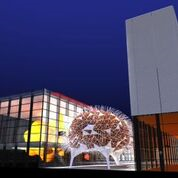Giant ‘nerve cell’ to be built in London’s East End
Planning permission has been granted for the construction of a new science education space in Whitechapel, East London at Centre of the Cell, Queen Mary University of London (QMUL).

Impression of Neuron Pod (Credit: aLL Design)
The striking ‘Neuron Pod’ will be a 10 metre high free-standing outside structure, and will connect via a bridge to the Centre of the Cell’s current space. Construction is aimed to begin by March 2017 and be completed December 2017.
Centre of the Cell currently has a unique embryo-shaped science education centre suspended above a biomedical research laboratory at QMUL’s Blizard Institute. The digital interactive public engagement project delivers educational programmes designed to inspire pupils to pursue a career in the sciences and engage the public with biomedical research.
Since opening in September 2009, over 135,000 young people and adults have participated in Centre of the Cell activities. The second Pod has been planned to address huge visitor demand, and will increase both visitor numbers and dwell time on site.
The 23 metre long Neuron Pod is designed by leading architect Will Alsop, creator of the existing Pod and surrounding Blizard Building, which has won numerous design awards including a Royal Institute of British Architects award. The Pod is designed with images of a nerve cell in mind, following on from the four pods inside the building that were inspired by images of certain cells or molecules.
Centre of the Cell’s Director, Professor Fran Balkwill said: “We are all very excited about Neuron Pod – this unique building will allow Centre of the Cell to fulfil its potential and offer so much more to our visitors. By providing an additional multi-functional space for live science shows, hands-on workshops, experiments, debates, films and exhibitions, we will continue to communicate the latest advances in medical research and maximise the number of people engaged with the subject.”
The space will also assist in hosting new adult initiatives in the evenings and at weekends, provide activities that are more relevant to Key Stage 4 (14 - 16) and sixth form school visits, improve disabled access, and increase the Centre’s ability to develop programmes for young people with learning difficulties.
Architect Professor Will Alsop OBE RA said: “I feel proud to have the opportunity to contribute to this amazing institution. Their work in encouraging young people is extraordinary. I think the new pod will help give young people an even more positive experience.”
Funders of the £1.8m Neuron Pod project include the Wellcome Trust, Barts Charity, the Wolfson Foundation, the Garfield Weston Foundation, Hobson Charity, Gosling Foundation and QMUL.
Professor Peter McOwan, QMUL’s Vice-Principal (Public Engagement and Student Enterprise) said: “The neuron pod will give us a new focus both for Centre of the Cell but also for public engagement at Queen Mary more generally, and I look forward to seeing the creative uses to which it is put.”
More information
- View the upcoming Neuron Pod in virtual reality
- Centre of the Cell